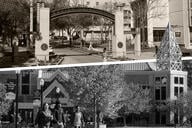You have /5 articles left.
Sign up for a free account or log in.
The trustees of Erskine College voted Friday to turn down a request from its religious denomination -- the Associate Reformed Presbyterian Church -- that church leaders be able to remove the college's board members.
The vote by the board is the latest development in several years of attempts to redefine the relationship between the church (known by the acronym ARP) and the college, which is the only higher education institution affiliated with the ARP and which includes the denomination's seminary. ARP leaders have been pushing for more control of the college, including the ability to fire trustees, but to date the college's board has won court orders to block such moves. The request from the church and the rebuff from the college were, in contrast to some of the maneuvers of recent years, out of court and polite.
The college issued a statement Friday in which the board chair, Joe Patrick, was quoted as saying that "the supporting reasons for this response are made clear from evidence in historical synod and Erskine documents, matters of law, accreditation standards, consultant advice and practical wisdom learned from other institutions by the diligent and thorough work done by the committee." At the same time, he said that the relationship between Erskine and the church "has been mutually beneficial for most of the institution’s nearly 175-year history, and Erskine wants the relationship to continue."
ARP leaders have substantial influence over the Erskine board in that they appoint trustees. The current conflict dates to 2010, when ARP leaders indicated their interest in removing many trustees, whom they viewed as insufficiently zealous in assuring fealty to church teachings. The board and administrators have been criticized along those lines from some in the church, while some professors and alumni believe Erskine's leaders (at the behest of the church) have been too rigid, and have restricted academic freedom in the interests of calming the dispute.
David A. Norman, president of Erskine, said in an interview Saturday that there were many reasons why some ARP leaders wanted the right to remove trustees -- some of them having nothing to do with the debates over the college's direction. He said that an ARP agency unrelated to higher education was left without a way to remove a trustee who was involved in a financial scandal, raising the issue of trustee removal. Norman said that he believed Erskine, as an educational institution, needed an independent board, and that the college's trustees had systems in place to deal with (even to remove if necessary) any trustee whose conduct was problematic.
Norman said that one factor in the trustees' deliberations was the requirement from the Southern Association of Colleges and Schools, Erskine's accreditor, that boards have appropriate levels of independence. SACS rules do not explicitly bar a larger board that appoints college trustees from also having the right to remove those trustees, but there are specific requirements that must be in place, and a college's board must always have the independence to make decisions on hiring, supervising and, if necessary, firing a college president. Erskine was briefly on the SACS warning list last year because of governance concerns, but in June was removed from that list.
Even though SACS was a factor, Norman said it would be unfair to imply that the trustees voted the way they did because of pressure from the accreditor. He said that the primary reason was broader than SACS rules. "I think that at this point in our history we need to make a very clear statement that the Erskine Board of Trustees has fiduciary duties for the institution," he said.
Norman said that there was "some disagreement" on the board about whether to agree with the church's request. But he said that he was "very proud of the way the board handled itself," and that the disagreements were discussed civilly. "It was a careful and spiritually informed discussion," he said.
He said he was concerned about the reaction that may come from ARP leaders, but that he hoped it would be one of understanding.
Andrew Putnam, moderator of the ARP General Synod and a trustee at Erskine, said that the ARP leadership would formally receive and discuss Erskine's response in June.




